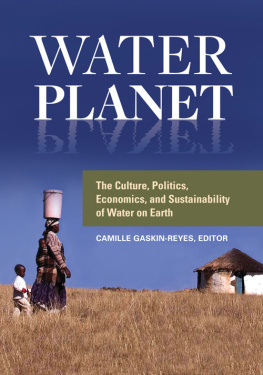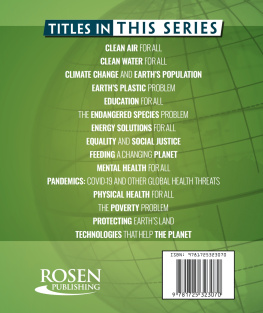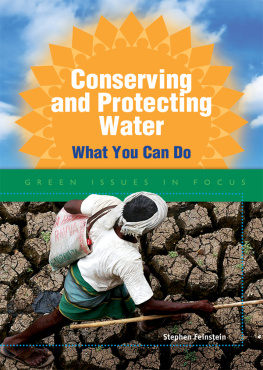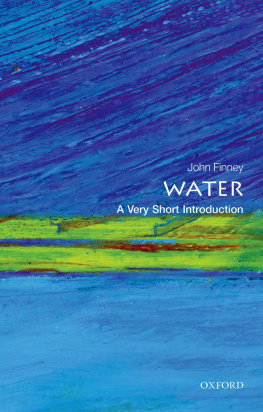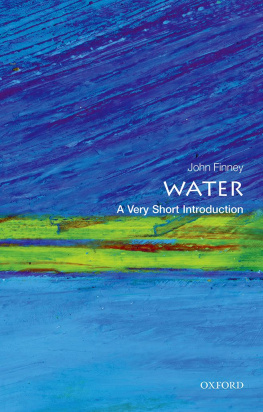WATER PLANET
WATER PLANET
The Culture, Politics, Economics, and Sustainability of Water on Earth
Camille Gaskin-Reyes, Editor

Copyright 2016 by ABC-CLIO, LLC
All rights reserved. No part of this publication may be reproduced, stored in a retrieval system, or transmitted, in any form or by any means, electronic, mechanical, photocopying, recording, or otherwise, except for the inclusion of brief quotations in a review, without prior permission in writing from the publisher.
Library of Congress Cataloging-in-Publication Data
Names: Gaskin-Reyes, Camille E., editor.
Title: Water planet : the culture, politics, economics, and sustainability of water on Earth / Camille Gaskin-Reyes, editor.
Description: Santa Barbara, California : ABC-CLIO [2016] | Includes bibliographical references and index.
Identifiers: LCCN 2016016137 | ISBN 9781440838163 (alk. paper) | ISBN 9781440838170 (ebook)
Subjects: LCSH: Water supplyPolitical aspects | Water-supplyEconomic aspects. | Water resources developmentPolitical aspects. | Water resources developmentEconomic aspects. | Water rights. | Marine ecosystem health. | Global environmental change. | Sustainable development.
Classification: LCC HD1691 .W3254 2016 | DDC 333.91dc23
LC record available at https://lccn.loc.gov/2016016137
ISBN: 978-1-4408-3816-3
EISBN: 978-1-4408-3817-0
20 19 18 17 16 1 2 3 4 5
This book is also available as an eBook.
ABC-CLIO
An Imprint of ABC-CLIO, LLC
ABC-CLIO, LLC
130 Cremona Drive, P.O. Box 1911
Santa Barbara, California 93116-1911
www.abc-clio.com
This book is printed on acid-free paper 
Manufactured in the United States of America
Every reasonable effort has been made to trace the owners of copyrighted materials in this book, but in some instances this has proven impossible. The editor and publisher will be glad to receive information leading to more complete acknowledgments in subsequent printings of the book and in the meantime extend their apologies for any omissions.
CONTENTS
PREFACE
This book presents an integrated picture of the role of water in everyday existence, whether in our economic pursuits, social activities, or cultural life. Water has been a fundamental and indispensable part of human life for millennia and continues to be our most precious life-supporting liquid, but we have not been good stewards of this priceless resource. Flowing through this book is the theme that we are now faced with the daunting challenge of securing safe freshwater supplies for the masses of people on the water planet, and protecting oceans and marine ecosystems for current and future generations.
examine water and climate change issues, including impacts of human-led greenhouse gas emissions since the industrial revolution, i.e., higher temperatures, ice melt, rising sea levels, storm intensity, and the vulnerability of low-lying areas. They delve into topics such as the increase of arid/water-stressed zones, water conflicts, climate equity for small island societies, and the urgency of climate change adaptation measures.
Both chapters focus on the linkages of climate change with population growth, economic development, energy, agricultural and industrial development, and disruption of the water cycle on a global scale. They make the point that since our shift to sedentary life and the growth of cities and industrial centers, we have become locked into an economic model based on fossil fuels, consumer-oriented growth, global trade, and competition for water.
The paradox discussed in these and other chapters is that on land we are increasingly facing problems of surface and groundwater quality, and on the oceans, pollution and overexploitation, yet we continue to draw down, pollute, compete, or increasingly fight for dwindling freshwater and marine resources. We have not been the best stewards of water since we stopped our hunting and gathering ways and moved into villages, cities, and industrial centers.
picks up this thread by discussing ocean and sea governance rules, people and drug trafficking, piracy on the high seas, and threats to peace and stability caused by competition for water.
discusses technologies to conserve water in the construction industry, the historical development of cities, water problems in African cities, and drought and water shortages in California.
reflects on the role of water in the generation of energy over millennia, controversies and conflicts of megadams, including impacts on communities and indigenous groups, environmental damage, reduction of water flow for downstream countries, and increased potential for regional conflicts.
outlines the significance of water in our cultural, religious, and spiritual lives, its prevalence in rites and practices, indigenous legends and myths, and its significance in many creation stories and humans relationships with deities throughout the ages.
maps a possible path forward to cope with water management problems, including specific challenges and opportunities to preserve and better manage the worlds water resources. It is a call to change. It emphasizes that even if we have not been the best stewards of water in the past or have undervalued its significance, we are now called upon to restore balance and face up to climate change, groundwater depletion and pollution, inefficiencies and inequity of water allocation, the gap between the global water haves and have notsand the threats of a parched and water-polluted future.
INTRODUCTION
Water: the building block of life. The planet is awash in it. We marvel at a perfect snowflake, a roaring waterfall, a babbling brook, and ice-cold water on a sweltering day. But we also tremble at the wrath of a storm, the fury of a flood, and the terror of a tsunami. This book underscores the pervasiveness of water throughout our social, economic, and cultural lives. We cannot live without water, but we can perish if we have too much of it in too short a time. Globally, hundreds of thousands of people die or are displaced yearly in the wake of hurricanes, storms, landslides, torrential rains, floods, river overspills, and coastal storm surges.
WATER PLANET
A perspective of Earth from space makes it easy to see why we are called the water planet: 71 percent of Earths surface area contains water. But 97.5 percent of this water is salt water, and only 2.5 percent freshwater. Two-thirds of this freshwater is frozen in snow, ice, and permafrost. The rest is surface water such as rivers, lakes and ponds, and groundwater stored in aquifers (Chellaney 2013).
This leaves relatively small amounts of freshwater for human consumption and other activities demanding water, creating the obligation for humans to be good stewards of this precious resource. This book is about how we have managed water in the past, how we are using or misusing it currently, and the challenges and opportunities we face in the future.
Water is in a state of continuous transfer called the hydrologic cycle. This cycle regulates the evaporation of water from oceans and the land to the airand its return to the land or sea through precipitation in the form of rain, snow, ice, fog, or sleet. Its makeup is simple: two hydrogen atoms (H2) bond with one oxygen atom (O) to form H2O, which is water in liquid, gaseous, or solid form.
But while waters chemical composition is simple, water issues are complex. Around 7 billion people share the planets limited freshwater resources, and they are not uniformly distributed around the world. Freshwater choices of the masses of people are mainly limited to aquifers below the ground, and springs, lakes, rivers, reservoirs, melted ice, or desalinated seawater on the surface. Many countries have an inadequate supply of freshwater, no matter the source; others are using up their water resources at fast rates.
Next page
